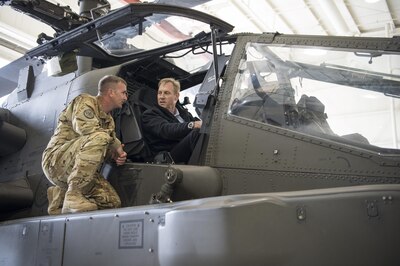By Lisa Ferdinando DoD News, Defense Media Activity
ABOARD A MILITARY AIRCRAFT, Nov. 16, 2017 — Deputy Defense
Secretary Pat Shanahan returned today from his first trip outside the Beltway
as the Pentagon's second-in-charge, armed with information to share with military
leaders and Congress on improving readiness.
The focus of the visits Nov. 14 and yesterday in Washington
state to Joint Base Lewis-McChord and Naval Air Station Whidbey Island was to
hear directly from service members about the successes and challenges they face
in readiness, Shanahan explained to reporters traveling with him.
His mission, he said, was to build upon the priorities of
Defense Secretary Jim Mattis. "The secretary always talks about lethality
-- and readiness is such a critical component of that," Shanahan said.
At Joint Base Lewis-McChord, Shanahan was briefed on Air
Force transport as well as innovation in 3-D printing. He observed Army
training and viewed combat assets, he lunched with airmen and soldiers, and he
talked with Army maintenance crews.
At Whidbey Island, he visited the Navy's Electronic Attack
Wing Pacific for discussions on the EA-18G Growler, an all-weather, electronic
attack aircraft with the primary role of suppressing enemy air defense systems.
At Patrol and Reconnaissance Wing 10, he toured aircraft and
had discussions with P-3 Orion maritime patrol squadrons and the EP-3 fleet air
reconnaissance squadrons. He closed out the visit with a tour of the Fleet
Readiness Center Northwest, which meets fleet requirements by providing responsive,
innovative, and cost-effective maintenance solutions for naval aviation systems
and equipment.
Candid Conversations
"You don't improve readiness by managing from behind a
desk," Shanahan said, explaining his intent at both bases was to have
candid conversations with the people who know the job best, whether the most
junior service member or highest-ranking person.
The Japanese, he pointed out, have an expression of going to
the “gemba.” In manufacturing, that means to go to the factory floor; he explained,
where you meet the workers and see what is really going on. "Quite often
what gets the attention is the difficult, demanding and dangerous missions that
people are doing downrange," he said. "But the work that these folks
do enables all of that."
Shanahan said he will use the information he gathered to
identify systemic problems and work on aligning leaders in those areas to
tackle those issues. All this, he explained, is to optimize readiness and make
the forces more lethal.
"The No. 1 reason that I took the trip to go understand
readiness was to be able to address to Congress what it is we need to do to
improve readiness," he said. "When I do spend time on the Hill,
people are very focused on 'We want to help, and we expect you to be articulate
on how we can help.'''
In addition to these visits, Shanahan made his first
international trip as deputy defense secretary, attending a U.N. Peacekeeping
Defense Ministerial conference yesterday in Vancouver, British Columbia.
Shanahan, who became deputy defense secretary in July, said
he engaged with fellow defense leaders from around the world, reaffirming
bilateral relationships and forging new friendships to take back with him to
Washington.









No comments:
Post a Comment